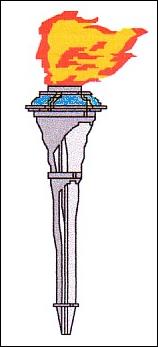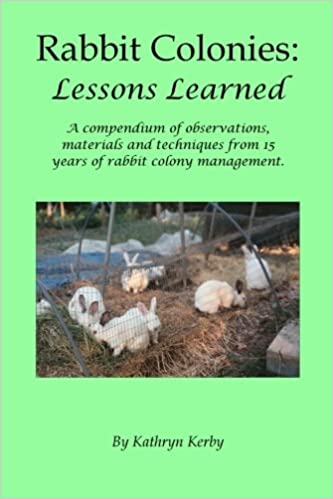Passing the Torch
January 21, 2011

I received an email this morning that made my whole day. To paraphrase, the email said that a husband and wife, living in Suburban America, had always dreamt of starting a farm. Yet they had no experience and they had concerns about how best to proceed with that dream. They had seen our farm website and had been inspired, and they asked if we would help them start making plans for how best to proceed.
I sent back an email saying we would be delighted to help them in any way we could.
At any given time, regardless of our jobs or age or socialeconomic status, we are all students. There is always so much more to learn. Yet we also have experiences and skills and talents that we have gained during our lives. Sometimes we take those skills for granted because we are focused on where we're going, not on where we've been. Sometimes we don't feel we know enough, and we doubt what we know. Alternately, sometimes we feel a little full of ourselves, and figure we've learned "enough" only to have Universe reach out and slap us around a little until we humble up a bit. But one way or the other, at any given time, we have a certain amount of information and experience and skills under our belt. We have the ability, and I believe the responsibility, to pass on what we've learned so far even as we continue to learn new skills or refine existing ones. It can sometimes be something of an exercise in juggling, to be sure. All this business of teaching others even as we continue to learn ourselves. But it apparently is one of the oldest, and most successful ways, that human beings have passed down information and skills through the ages.
Many agricultural analysts have pointed out recently that the average farmer is getting older, and fewer individuals in the next generation are ready, willing and able to take their places in farming's future. I do believe the average farmer is getting older, but I don't buy it for a minute that folks don't want to farm anymore. Rather, I think that folks who feel a tickle to plant things, or a yearning to raise animals, have the seeds of agriculture already sprouting within them. So the question is not how to cajole or coerce or bribe more folks into a discipline that they wouldn't want to be in otherwise. The question is how to encourage folks who already want to be there. How to impress upon them that this business, this craft, this art and science, can be taught successfully. That's regardless of who they are, where they are, how old they are, and what challenges they may have. I'm firmly convinced that agriculture is one of humanity's defining attributes. We've been farming too long as a species to have lost the will to farm, in only a few generations. That would be like birds losing interest in flight, dogs losing interest in cats, and cats losing interest in warm sunny windows. It is an integral part of who we are.
So the trick for those who are interested in farming, but not already involved in farming, is to hook them up with mentors. Folks who can guide them from a state of unknowing to a state of knowing, whether that is in animal husbandry, soil science, horticulture, farm machinery, genetics, or whatever. When someone looks at our farm, or any farm, they often see an imposing image of a completed operation. Oh, goodness, let me assure you we're only getting started. And we had lots of help along the way. Even now, we seek out expertise in a variety of categories as we continue to learn about how best to keep this farm running, and improve it along the way. Yet we started with a bare piece of ground. Whatever we yet need to learn, we have learned enough to get where we are. And that information is worth something to someone who hasn't gotten that far yet.
So even as I continue to consult with various mentors of my own, about how best to market our veggies, or how to tweak our goat herd nutrition, or how to get the pigs bred, I am honored, and honor-bound, to pass on whatever I have learned so far to those wonderful individuals who reached out to me and asked for help. May anyone who has ever had an interest in learning about farming, find someone to teach them. May anyone who has ever successfully planted a seed, tilled a field or raised up an animal, share that information with others. Please pass the torch. It's what keeps knowledge alive.
Our Successful Farming and Ranching Books

We released our very first self-published book. The Chicken Coop Manual in 2014. It is a full color guide to conventional and alternative poultry housing options, including 8 conventional stud construction plans, 12 alternative housing methods, and almost 20 different design features. This book is available on Amazon.com and as a PDF download. Please visit The Chicken Coop Manual page for more information.

Rabbit Colonies: Lessons Learned
We started with rabbits in 2002, and we've been experimenting with colony management ever since. Fast forward to 2017, when I decided to write another book, this time about colony management. The book is chock-full of practical information, and is available from both Amazon and as a PDF download. Please visit the Rabbit Colonies page for more information.
The Pastured Pig Handbook
We are currently working on our next self-published book: The Pastured Pig Handbook. This particular book addresses a profitable, popular and successful hog management approach which sadly is not yet well documented. Our handbook, will cover all the various issues involved with pastured hog management, including case studies of numerous current pastured pig operations. If you have any questions about this book, please Contact Us.

Weblog Archives
We published a farm blog between January 2011 and April 2012. We reluctantly ceased writing them due to time constraints, and we hope to begin writing them again someday. In the meantime, we offer a Weblog Archive so that readers can access past blog articles at any time.
If and when we return to writing blogs, we'll post that news here. Until then, happy reading!




